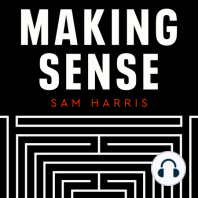16 min listen
#363 — Knowledge Work
ratings:
Length:
52 minutes
Released:
Apr 15, 2024
Format:
Podcast episode
Description
Sam Harris speaks with Cal Newport about our use of information technology and the cult of productivity. They discuss the state of social media, the "academic-in-exile effect," free speech and moderation, the effect of the pandemic on knowledge work, slow productivity, the example of Jane Austen, managing up in an organization, defragmenting one's work life, doing fewer things, reasonable deadlines, trading money for time, finding meaning in a post-scarcity world, the anti-work movement, the effects of artificial intelligence on knowledge work, and other topics. If the Making Sense podcast logo in your player is BLACK, you can SUBSCRIBE to gain access to all full-length episodes at samharris.org/subscribe. Learning how to train your mind is the single greatest investment you can make in life. That’s why Sam Harris created the Waking Up app. From rational mindfulness practice to lessons on some of life’s most important topics, join Sam as he demystifies the practice of meditation and explores the theory behind it.
Released:
Apr 15, 2024
Format:
Podcast episode
Titles in the series (100)
#5 — After Charlie Hebdo and Other Thoughts: Sam Harris answers reader questions in the wake of the terrorist attacks in Paris. by Making Sense with Sam Harris
